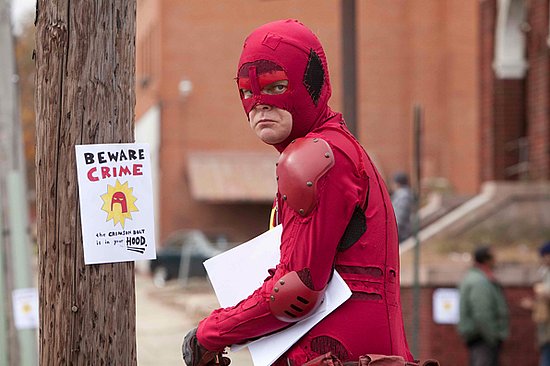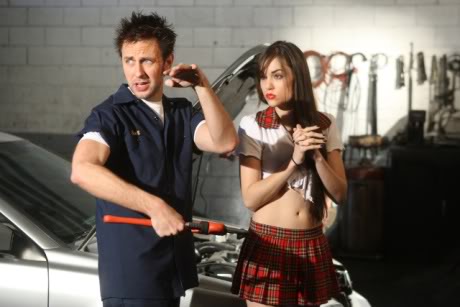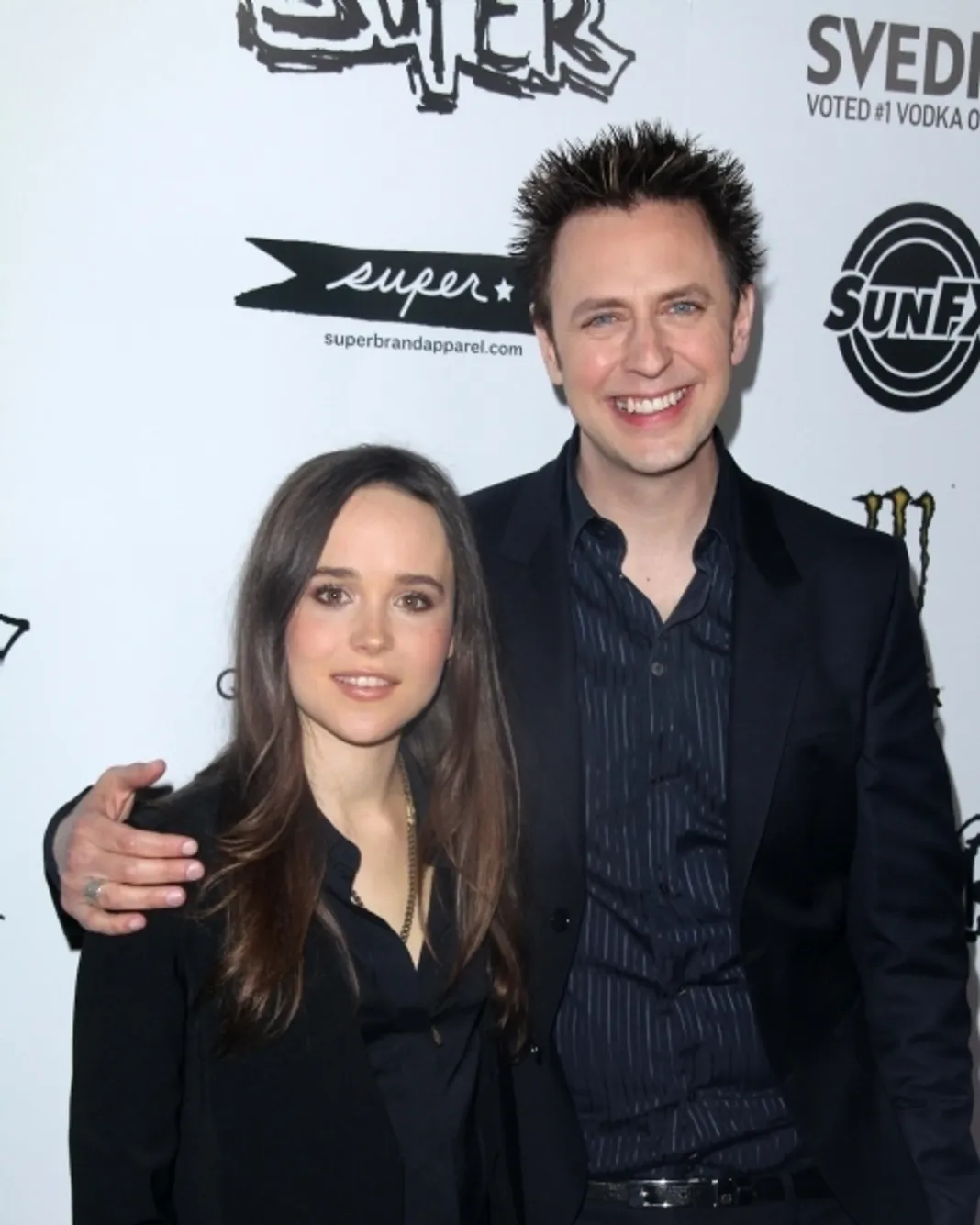 James Gunn is a very strange person and I mean that in the nicest way possible. After all, it would take a weird guy to make a movie with Rainn Wilson as a vigilante super hero and Ellen Page as his hyper-violent side-kick, but thankfully Gunn went ahead and did it. Super is an incredible movie that weaves violence, gore and humor together almost seamlessly and it is easily Gunn’s best work to date. I was lucky enough to snag an interview with the writer/director and we talked about the grueling process of making the movie, his views on spirituality and tentacle rape porn among other things. Check it out below.
James Gunn is a very strange person and I mean that in the nicest way possible. After all, it would take a weird guy to make a movie with Rainn Wilson as a vigilante super hero and Ellen Page as his hyper-violent side-kick, but thankfully Gunn went ahead and did it. Super is an incredible movie that weaves violence, gore and humor together almost seamlessly and it is easily Gunn’s best work to date. I was lucky enough to snag an interview with the writer/director and we talked about the grueling process of making the movie, his views on spirituality and tentacle rape porn among other things. Check it out below.
A few days ago I happened to catch Rainn Wilson on Leno talking about Super and when I saw Leno describe the movie he looked really freaked out about it. Did you see that?
That was the best thing ever (laughs). I talked to Rainn a little after and I asked did Leno really watch the movie? And he said yeah, he watched the whole thing the whole way through and he didn’t know what to think about it.
In your writing process, how important is the story structure to you? As you’re writing do you pay attention to that or just let the story flow and dictate itself?
I do pay attention to it although I change everything up from screenplay to screenplay. Frankly I’m much more conventional than Super is. Super has a very unconventional structure for a number of reasons. The second lead doesn’t become a big part of the movie until half way through and then she’s in it for everything after that. There’s a lot of things like that in Super where I’m purposefully playing with that structure. But you know, despite all that, at the heart of it, it’s still a pretty distinct 3-act structure and the stuff that is unusual about the structure is in some ways pretty much on the outside.
What about Joesph Campbell’s The Hero’s Journey? Do you tend to follow his method of story structure?
Dude, I do. I don’t really think so much about that stuff while I’m writing. I do sometimes but all of those things, I think about them when I’m working on the screenplay. I think of Campbell’s Hero Journey’s which I think is the best, it’s very inspiring and less restrictive. I get something out of (Robert) McKee’s Story and I think there’s great stuff, in a more simple book for beginning screenwriters, in Save the Cat, by Blake Snyder. It’s a fantastic guide to writing, the basics of writing a screenplay. There’s stuff in there that’s majestically insightful, the refusal of the call is always in there. Our refusal of the call takes place in the middle of the film.
What did writing Super teach you as a writer?
Super is a thing I’ll never be able to replicate. I really did sit down one day, I was going to write a short film and I ended up writing this 57 page story that I thought was very funny. It moved me a lot. I was sobbing at the end of writing this screenplay. And I was so moved by it and so attached to the characters I fell in love with the characters while writing and it just appeared, I didn’t plan on any of it. Then I kept going with it and took it further and had a lot of fun filling out the other holes. The first draft, for instance, didn’t have Andre Royo’s character, Hamilton, in it. Adding him later was a lot of fun. Finding other characters in this person’s life and other aspects and other ways that I’m playing with themes, it’s much more how I wrote my novel, “The Toy Collector”, the writing processes were very similar in those two things. But most things, I outline everything ahead of time.
What did the process of making the movie do for you as a filmmaker?
On Slither, I pretty much did what I wanted but there were times in which I probably wasn’t as confident as I wish I was in my choices and at times would let other people take leads on certain things. On Super I knew I couldn’t do that. I knew that through the whole movie I had a very distinct idea of what it would be from scene to scene, from shot to shot, from line to line. I needed to really to guide the movie exactly as I wanted it to be. And we didn’t have time to waste time because we moved so quickly. So on normal films you do between 12-20 set ups and on this movie we did between 45-50 full camera set ups every single day. We were breaking our backs and had no room for errors. We had to be completely prepared and planned out. I learned I really had to trust my instincts. If you fail at least you fail on your own terms.
 Super, despite being a super hero movie, has a very heavy religious subplot that seems to hold spirituality in high regard but mock Christianity at the same time. Rainn Wilson’s character is very religious but he’s seen watching this movie that parodies born-again Christians. Since we couldn’t really get a clear view from the movie, what’s your view on Christianity and spirituality?
Super, despite being a super hero movie, has a very heavy religious subplot that seems to hold spirituality in high regard but mock Christianity at the same time. Rainn Wilson’s character is very religious but he’s seen watching this movie that parodies born-again Christians. Since we couldn’t really get a clear view from the movie, what’s your view on Christianity and spirituality?
It’s not about my views, it’s about whoever watches the movie. My personal take is that there is a role for spirituality in some people’s lives and I think that a belief in God can be a good thing for a great amount of people. I do not like any sort of faith or religion that is based on exclusivity, meaning any sort of religion that says you’re damned to hell or you’re not going to be saved because you don’t believe the same thing I do. I believe faith and spiritual belief is a very, very personal thing and if I started applying what I believe to everybody else it would be unfair to everybody’s individuality and I really hate that. And I think that’s what you’re kind of seeing in the movie. Frank is inspired by this character who is a born-again christian superhero. Frank himself isn’t really ever said to be a Christian. He doesn’t ever pray to Jesus, he prays to god. Even though he sees a vision of Jesus when he’s younger, but even that Jesus is unconventional.
To completely change gears for a second, one of the most shocking things I saw in the film was the tentacle-rape-porn scene. Can you tell us a little more about that and why you included it?
I get asked about that so much. It wasn’t planned like that, it wasn’t in the original script that he saw the tentacle porn before hand. But then I thought about it afterward, well why is he seeing tentacles? Oh! Because he was watching tentacle porn before watching it.
It was definitely the classiest use of tentacle porn I’ve seen.
Yeah (lauhs). The tentacle porn animation in the movie was done by Puny Entertainment that also did the opening. And the voice is my girlfriend, Mia Matsumiya, that’s her moaning in delight as she’s raped by the tentacles.
You’ve been with this movie pretty much non-stop for over a year. Are there any scenes that still stick out that make you laugh or wince?
Yes. First of all, I still love watching the first prayer scene with Rainn. I love Rainn in that scene. And every time I see that scene I’m overcome to gratitude to him and my ex-wife Jenna Fisher for putting us together and manipulating us into making this film. I love watching that scene. *Spoiler* The death of Michael Rooker where Rainn is slamming his head against the corner of that fireplace still makes me uncomfortable. That is the one thing in the movie that from first seeing makes me uncomfortable. It’s weird because I know exactly what it is, it’s not a real fireplace, he’s not really hitting his head. It’s totally fake! Boy, it’s hard for me to watch. And it’s also because it’s Rooker and he’s my friend. He’s doing a great job of getting his head hit and being pissed off. But it makes me wince.
Any specific movies that you wanted to influence you while making this?
Yeah, I had a lot of movies that influenced the movie. The major movie that influenced me that influenced the way we shot the film. The actual style and cinematography. One of which was the movie Bully, the Larry Clarke film, which is the movie I saw and said that’s how I want super to look. And then I got Steve Gainer, the cinematographer of that movie to shoot Super. That was an influence. The films of Lucas Moodison, who did a movie called Show Me Love and another one called Together, those movies are influential. But also, Taxi Driver was probably the biggest influence overall. There were a lot of different movies. And simultaneous to that, there’s this element mixed in of Doris Day movies with the graphics that interplay, weird segues, animations, all that stuff is mixed with in the darker more gritty style of filmmaking. And that was the mix I wanted to have on screen.
One of the few questions I had when watching this was the inclusion of animated fighting sounds? After watching such a realistic movie for the first two thirds, why include such cartoony references?
It does show up a few times, there is animation a few times. What it’s about is that we see these superheroes all the time and they’re punching people and knocking people out and blowing stuff up, but we don’t see the real ramifications of the violence. In Super we’re seeing the actual results of the violence. But I also wanted to contrast that with the pop culture idea we have of superheroes beating up bad guys which is the BAM POW WAM. Putting those things together on screen is what that’s about. It’s about seeing the reality and the complete unreality transposed.
You’ve done superhero movies, horror movies, even worked on children’s movies. With so many very bad superhero movies and horror movies out there, what separates the really good from the rest?
Story, everything else about a movie can suck but if people really like the story it works. Obviously good stories can get screwed up through bad directing and bad acting but you can never fix a bad story with good directing and acting. I think it’s really the stories. To be completely blunt, watch Iron Man and Iron Man 2. Robert Downey Jr. is amazing in both of them, the action sequences are great, but Iron Man had this really great through line that works on a number of different levels and it’s a fantastic movie. But Iron Man 2? Not so much.
When you wrote Dawn of the Dead, how closely were you working with Zack Snyder?
Pretty closely. Well, I wrote Dawn of the Dead long before Zack was ever involved. But once Zack came on board then we worked quite closely together.
What do you think about Sucker Punch and his upcoming Superman?
We’ll see? (laughs). I’m excited for Superman, Zack is an amazing visual storyteller. It’s going to come down to the same thing–hopefully the story for Superman will be good and tight. If Zack has a tight story, then he’s one of the greatest directors in the world.
 I have to say, I really enjoyed your web series PG Porn. What did you learn from doing that, from online content to working with porn stars…what did you take away from that?
I have to say, I really enjoyed your web series PG Porn. What did you learn from doing that, from online content to working with porn stars…what did you take away from that?
PG Porn, for me, was great because I have been stuck doing big studio movies, really getting caught up in the business side of it, and not having all the bullshit. And PG Porn came along and I got to do something where I had 100% control over what I did. I owned the rights to the show so I could do whatever I wanted in terms of that. And I got to work with people that were really excited about doing it, honestly. The actors, for the most part, were excited about meeting porn stars, and the porn stars were really excited about being given the opportunity to act as opposed to doing porn, you know? It was something new for them. Every episode was just a whole lot of fun to shoot and it brought me back to this sort of creativity of my early days at Troma where I could do whatever I wanted. And it reminded me why I like the industry, why I like this business and why I like making people laugh. That was a great thing, and I don’t think I could have done Super without PG Porn. The other thing about PG Porn was that we made those things for like $1,000-$2,500 a piece, but because we did it for such a low amount of money, I’m like, “Listen, we could make Super for a couple million bucks, you know? We can do it.” So then Rainn and I really sat down and said that we make Super with as small of a crew as PG Porn; we can make it for nothing. And of course it ends up being a little bit of a larger crew than that, but no more money. So, I have to shoot quickly, I have to be prepared, I have to know what I’m doing…and if you do those things, then you gain a lot of freedom.
Are there any plans in the future for more PG Porn?
I don’t know. We actually have a couple more scripts that I want to tell. I think we have four more scripts and stories of PG Porn, but the truth is, even though it’s one of the most successful web series, we made a lot of money off of PG Porn. Well, not a lot of money, but by web series standards we made a lot of money off of PG Porn. People are very afraid–like, we got kicked off of Spike because somebody from Viacom was on Spike and saw it and was like, “oo!”. And even though you go on Spike’s website today, we’re still like the biggest thing by far on that site. But you know, people are afraid of something called PG Porn with porn stars in it. It’s so ridiculous, but that’s the way it is. So it’s a little hard to get the money to make them and I financed the first batch and I just don’t really feel like doing that again.
What else do you have coming up?
I’ve got Movie 43, which I am finishing up, which is a Farrelly Brothers project in which there’s a bunch of different comedy directors directing different comedy shorts connected by a common through line. It has everybody from Hugh Jackman to Cate Winslet to Halle Berry in it, and I did a short with Elizabeth Banks and Josh Duhamel and an animated creature that is completely, completely fucked up. And people seem to like it in the test audiences, so I’m finishing that up. I’ve got a video game that I worked on coming out — but it’s a secret unfortunately. So then I’m figuring out what I’m going to do next. So I’m trying to decide, there’s a couple things coming at me, I’ve got a script I finished that I like a lot. So we’ll see what I’m going to do next.


